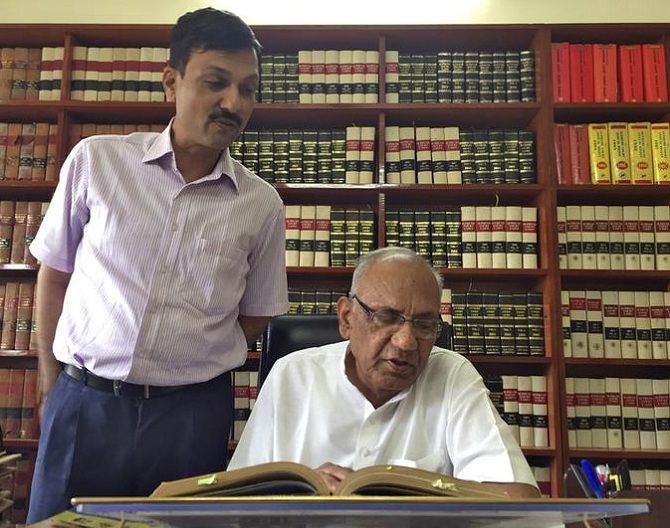With the demand for lower costs in process driven activities and a move away from the high rate, billable hours and partner tribute model of legal services, AI platforms are being used internationally in a multitude of legal tasks.
Sayan Ghosal reports.

Artificial Intelligence (AI) is fast becoming the new buzzword amidst the Indian legal sector.
The adoption of AI technology has already gained marked prominence in the global legal market and Indian firms, too, are looking into this potential treasure trove of innovative assistance to aid in their own activities in the coming days.
Michio Kaku, noted physicist, theorist and futurist once said that the job market in the future will consist of those activities that robots cannot perform. Taking heed of this premonition, India's top legal service providers seem to be moving past the traditional model of technological insularity and setting their sights on riding the AI wave.
Cyril Amarchand Mangaldas, one of the leading law firms in the country, has been the first to make a public announcement, stating their intention to adopt AI technology for certain legal process activities.
In an agreement with Kira Systems, a Canada based technology company, the firm intends on using the Kira machine-learning software for greater automation of its due diligence and transactional practices, which they say will usher in a new era of efficiency and accuracy for the benefit of their clients.
"The application of AI in the legal sector is a growing global trend and allows lawyers to devote their time and skill towards more specialised tasks. The system is proven to be fast and accurate, allowing a firm to move up the value chain and attain greater international competitiveness," says Cyril Shroff, managing partner, Cyril Amarchand Mangaldas.
The use of software has been prevalent in first-tier firms in India for some time already.
Organisations such as Nishith Desai Associates already engage data management, knowledge management and bandwidth management systems, in addition to a variety of public and in-house applications. The eventual adoption of dedicated AI platforms will incorporate this use of technology to more data intensive tasks such as analytics, contract review, document scrutiny and regulatory compliance in the near future.
The implementations of these adaptive systems are also pitted to provide greater efficiency and risk mitigation, while also providing large time based advantages.
Globally, the advent of AI systems for the legal sector came as a furtherance of the Legal Process Outsourcing (LPO) model to reduce costs of high volume-low value activities and cater to the changing needs of society.
With the demand for lower costs in process driven activities and a move away from the high rate, billable hours and partner tribute model of legal services, the focus shifted towards investing into the previously ignored areas of innovation and technology.
AI platforms are now being used internationally in a multitude of legal tasks such as automated challenges to car parking tickets, which apart from time and hassle, would also require a party to incur larger legal fees than the cost of the infraction itself.
DoNotPay is one such service in New York and London, which provides such a service free of cost and has managed to achieve a 64 per cent success rate.
Apart from these and the wide variety of transactional usages mentioned, AI systems like IBM Watson and Kira are also being used in other complex legal matters and for litigations involving US federal patent cases with great success.
In recent times, the technology has also been implemented in judgment predictions and risk assessments.
There is also large potential for the applicability of AI in cross-border contract drafting, negotiations and decision-making exercises undertaken by law firms and their clients.
AI also has the potential to impact the retail legal market dramatically, by proving greater reach and lowering of costs, which in turn will significantly better "access to justice" issues and in turn benefit millions of individuals.
While most legal professionals agree that AI does possess certain definite advantages, some are still sceptical of its applicability to more complex tasks requiring value addition. Many have highlighted that AI platforms require a comprehensive database, which is still in its nascent stages in the Indian judicial scenario.
The integration of continually developing information is another area of concern.
"The assimilation of constantly evolving data such as regulatory updates or judicial precedents into an AI platform poses a challenge. Feeding in large volumes of information into the system is also a time intensive process. But as the software is used, it gets smarter and more efficient," notes Huzefa Tavawalla, head, International Commercial Law Practice, Nishith Desai Associates.
According to Sitesh Mukherjee, partner, Trilegal, AI is slowly permeating into the Indian legal market, particularly with regard to tasks such as due diligence, but its applicability in other avenues will still take time to gain acceptance.
Critique aside, the adoption of AI technology in the Indian legal sphere in the near future is merely a question of degree rather than probability. And, this assimilation of AI will certainly enhance process management and eventually change the role of legal professionals in our swiftly evolving business environment.
"The commercial applicability of AI software in the legal industry is just 12 to 18 months old. With the increasing use of technology in law firms, we can expect to see greater adoption of these kinds of platforms in days to come," says Shroff.
Though a recent Deloitte study says that AI is expected to automate around 1,14,000 legal jobs in the UK by 2020, its impact on the requirement of Indian legal professionals should be far from alarming. Rather, it is expected that in times to come, these industry players will increasingly work alongside AI platforms to provide greater human resource utility and better legal solutions for society as a whole.












 © 2025
© 2025